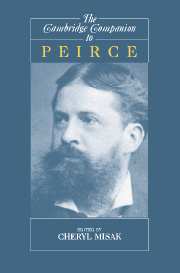Book contents
- Frontmatter
- 1 Charles Sanders Peirce (1839-1914)
- 2 Peirce's Place in Pragmatist Tradition
- 3 Peirce and Medieval Thought
- 4 Reflections on Inquiry and Truth Arising from Peirce's Method for the Fixation of Belief
- 5 Truth, Reality, and Convergence
- 6 C. S. Peirce on Vital Matters
- 7 Peirce's Common Sense Marriage of Religion and Science
- 8 Peirce's Pragmatic account of Perception
- 9 The Development of Peirce's Theory of Signs
- 10 Peirce's Semeiotic Model of the Mind
- 11 Beware of Syllogism
- 12 Peirce's deductive Logic
- Note on References
- Bibliography
- Index
3 - Peirce and Medieval Thought
Published online by Cambridge University Press: 28 May 2006
- Frontmatter
- 1 Charles Sanders Peirce (1839-1914)
- 2 Peirce's Place in Pragmatist Tradition
- 3 Peirce and Medieval Thought
- 4 Reflections on Inquiry and Truth Arising from Peirce's Method for the Fixation of Belief
- 5 Truth, Reality, and Convergence
- 6 C. S. Peirce on Vital Matters
- 7 Peirce's Common Sense Marriage of Religion and Science
- 8 Peirce's Pragmatic account of Perception
- 9 The Development of Peirce's Theory of Signs
- 10 Peirce's Semeiotic Model of the Mind
- 11 Beware of Syllogism
- 12 Peirce's deductive Logic
- Note on References
- Bibliography
- Index
Summary
Introduction
Peirce's knowledge of and attitude toward medieval thought was clearly unusual among his peers, and it contains some interesting surprises. His critical remarks, of course, while more colorful than most, are not unexpected.
It is not worth our while . . . to ascertain what the schoolmasters of that degenerate age conceived mathematics to be. (CP 3.554, 1898)
[A] beastlike superficiality and lack of generalizing thought spreads like a pall over the writings of the scholastic masters of logic. . . . (CP 1.561, 1907)
Moreover, he seems to think the entire era was, with the possible exception of Roger Bacon, lacking in a scientific appreciation or outlook.
Peirce’s criticism of the later decadent scholasticism is of special interest for its reference to the followers of Scotus who had gained control of the universities and were given (by the humanists) the sarcastic title of “dunses” or “dunces” (CP 1.17–18, 1903; 2.166– 8, 1902). They “set up their idle logical distinctions as precluding all physical inquiry” (CP 6.361, 1902). And while they were on the right side of the realist–nominalist issue, “their dunsical opposition to the new learning and their dreadful corruption of the university disgusted the new men” (CP 7.666, 1903).
At the same time, Peirce’s putdown of the humanists’ reaction to the scholastics is if possible even more rude. The Dunses defended their position “with a logical accuracy, born of centuries of study, with which the new men were utterly incapable of coping”; they needed to formulate objections to the Dunses’ positions, but it was “a business for which they were utterly unfitted” (CP 6.361). The humanists, he says “were weak thinkers” (CP 1.18). “The renaissance . . . condemned the scholastic terms as not being Ciceronian, with the result of making renaissance philosophy as soft and savorless as a sage pudding” (CP 7.494 n9, c1898).
- Type
- Chapter
- Information
- The Cambridge Companion to Peirce , pp. 58 - 86Publisher: Cambridge University PressPrint publication year: 2004
- 9
- Cited by



